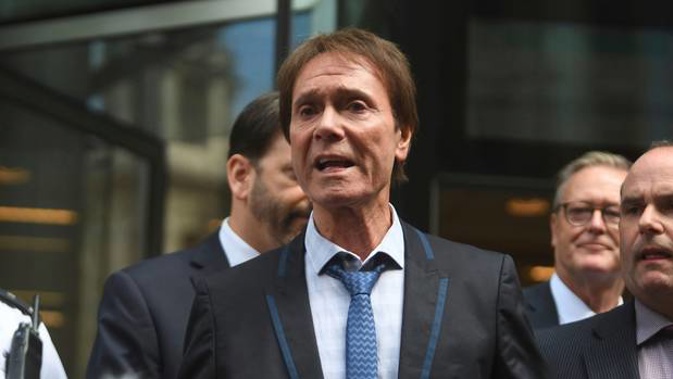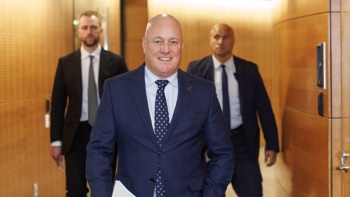
Sir Cliff Richard has revealed the devastating impact of his four-year legal battle with the BBC after it finally came to an end today, saying he 'won't go anywhere near children' again.
The popstar said the harrowing toll of the case on his day-to-day life means he will "never completely recover" from the ordeal and he no longer comes into contact with other people's children for fear of the repercussions.
His words came after a High Court judge ruled the BBC had invaded his privacy by broadcasting a police raid of his Berkshire home live on TV after he was linked to a child sex abuse claim, the Daily Mail reports.
No charges were ever brought against the 77-year-old and he was today awarded £210,000 (NZ$404,000) in damages. The corporation could be left with a bill of up to £5million (NZ$9.6 million) after the case dragged on for so long.
Justice Mann said the BBC had infringed the star's privacy rights in a "serious and sensationalist way" and increased the damages because the corporation boasted about its "scoop of the year" at an awards event.
Speaking to ITV News straight after the decision, he said: "I used to use it [a tunnel linking Centre Court and Court One at the Wimbledon tennis tournament] regularly to go and see the matches I was interested in on Court One and it went right past the ball boys dressing room.
"I won't go there now. I won't go anywhere near children. Why? I've spent my whole life hugging people's grandchildren."
The BBC is considering an appeal against the judgment and who pays the legal costs of the case will be decided at a hearing next week.
BBC Director of News Fran Unsworth branded the ruling a "dramatic shift against press freedom" adding: "It means police investigations, and searches of people's homes, could go unreported and unscrutinised."
An overwhelmed Sir Cliff hugged friends after the judge gave his decision and told reporters outside London's High Court he was "choked up", adding: "I can't believe it. It's wonderful news."
His fans gathered outside the court building and even sang "congratulations" as he walked out earlier today.
He later spoke exclusively to ITV, saying: "They [senior managers] have to carry the can. I don't know how they are going to do it, but they'll have to. If heads roll then maybe it's because it was deserved...It's too big a decision to be made badly. It was nonsense."
Sir Cliff took legal action against the BBC over the live broadcast of a South Yorkshire Police raid on his home in Sunningdale, Berkshire, in August 2014, following a child sex assault allegation.
He was never arrested or charged and his case was discontinued by the Crown Prosecution Service in June 2016.
Mann ruled: "I find that Sir Cliff had privacy rights in respect of the police investigation and that the BBC infringed those rights without a legal justification.
"It did so in a serious way and also in a somewhat sensationalist way. I have rejected the BBC's case that it was justified in reporting as it did under its rights to freedom of expression and freedom of the press."
The judge awarded Sir Cliff £210,000 (NZ$404,000) damages for the "general effect" on his life and said he is entitled to recover further sums for the financial impact on the star, which will be decided at a later date.
The judge said £20,000 (NZ$38,000) of the damages were due to the BBC aggravating the case by nominating the story for a "Scoop of the Year" award at the Royal Television Society Awards.
It was previously claimed Sir Cliff was seeking more than £600,000 (NZ$1.1 million) from the BBC - £250,000 (NZ$480,000) in compensation, £278,000 (NZ$534,000) legal costs and £108,000 (NZ$207,000) for PR. He has previously claimed he spent £3.4million (NZ$6.5 million) clearing his name.
The BBC will also have its own huge legal bill for the long-running case, meaning the cost to the corporation is expected to top £1million (NZ$1.9 million).
The £210,000 damages award is thought to be one of the highest ever awards in a UK privacy case.
In one of the most high-profile previous cases, Max Mosley was awarded £60,000 (NZ$115,000) in 2008 after the News of the World accused him of taking part in a "sick Nazi orgy".
It is understood damages awarded to victims of phone hacking have been higher, although the amount paid out in the those cases has remained private, with lawyers saying only that they run into "six figures".
Speaking after the decision, Sir Cliff's lawyer Gideon Benaim said that, after 60 years in the public eye, Sir Cliff never expected to have his 'privacy and reputation tarnished in such a way'.
Sir Cliff's lawyer spoke on his behalf, while the star declined to comment fully immediately after the case had ended, saying only: "It's going to take me a little time to get over the whole emotional factor."
He later spoke exclusively to ITV news, saying he was "horrified" when he found out about the police raid and would "rather been burgled". The singer also admitted he "innocently thought it would blow over".
The star slammed the BBC for "abusing freedom of speech" and described their decision making as "anarchic".
He said: "I will fight to the death against the abuse of the freedom of speech, what the BBC did was an abuse because it seems to ignore anything that was ever stated - Magna Carta, Leveson, the police and they took it upon themselves to be judge, jury and executioner.
"Freedom without responsibility is anarchy. To me this was an anarchic thing to do."
Speaking straight after leaving court, he told the news channel he is "not over" the ordeal, and does not feel "triumphant" about it.
He added: 'I don't feel any kind of triumph. It was triumph in one respect. But for me I don't feel so triumphant that I should gloat. And so I'm not going to.'
Sir Cliff said he 'always found it hard' to process the fact he was suing the BBC, because he still watches its TV output to catch up with current affairs.
He told ITV: I have always found it hard to say I was going to sue the BBC because for me the BBC are the people that work there.
"I listen to the show. Depending on the time zone I'm in, I catch up with news in Australia or America. I watch BBC World News. That's the BBC to me.
"But there has to be something done that says you cannot do this again, you must not do it again."
Sir Cliff had been greeted by fans at the entrance of the High Court this morning, and was supported by long-time friend Gloria Hunniford.
Gloria Hunniford later told Loose Women: "He said to me, 'I prayed every single night for four years that truth would out'. That was a really important statement.
"He was so excited. We were all shaking and excited. Then as he went down to face the press... and the lawyer read out the citation... I think he (Sir Cliff) just wasn't able to speak."
She said: "I don't think he'll truly get over it... I don't think you get over four years of turmoil like that. He's such a lovely man. He's a good honest man. I think he took it so much to heart."
In his judgment, Mann found that the BBC was the "more potent causer" of the damage to Sir Cliff and its breach of the singer's privacy was "more significant" than South Yorkshire Police's.
He said reporter Dan Johnson "knew, or ought to have known" that what he was getting from the police was "exceptional" and was provided in breach of confidence.
The judge said of reporter Johnson: "He was, like any responsible reporter, anxious to get knowledge of, and become involved in, big stories, and in my view was anxious to make a bit of a name for himself by getting this story and bringing it home.
"I do not believe that he is a fundamentally dishonest man, but he was capable of letting his enthusiasm get the better of him in pursuit of what he thought was a good story so that he could twist matters in a way that could be described as dishonest in order to pursue his story."
Johnson, who the judge referred to as "junior member of the news gathering team, covering the north of England", has been reporting from India and Bangladesh in recent months.
The judge said of the BBC's Gary Smith, one of Johnson's bosses, that be became "very concerned" almost "obsessed" with "scooping" their rivals.
"When he heard the accusations being made against him and what the BBC had done he just collapsed in tears, as indeed he did today."
The presenter added: "He has spent £4million of his own money on lawyers' fees... I hope his life begins again as from now."
The judge also said the decision to publish was 'entirely the BBC's' and that the corporation 'chose the prominence given to the news'.
The judge assessed the responsibility for the damage caused to Sir Cliff as being split 65 per cent to 35 per cent between the BBC and SYP respectively.
Sir Cliff's lawyer Benaim said the singer had originally wanted the BBC to apologise and admit wrongdoing, and only went to court after it failed to do so.
Radio DJ Paul Gambaccini, who himself spent a year on bail before being told he would not face charges following a sexual assault allegation, also attended court to support Sir Cliff.
Gambaccini told Sky News Sir Cliff had initially been reluctant to sue the BBC, but felt it was necessary to stop suspects being named before they are charged.
During the trial of the issue, the court heard how, in late 2013, a man made an allegation to the Metropolitan Police, saying he had been sexually assaulted by Sir Cliff at Sheffield United's Bramall Lane stadium in 1985.
Metropolitan Police officers passed the allegation to South Yorkshire Police in July 2014.
BBC reporter Johnson was given the details of the raid by the force and the BBC filmed police going into his Berkshire home while Sir Cliff was away in Portugal.
Sir Cliff always denied the allegation and in June 2016 prosecutors announced he would face no charges.
His lawyer, Justin Rushbrooke QC, previously told the High Court the 77-year-old had sustained "possibly permanent damage to his self-esteem" as a result of the BBC's coverage.
During the case, the corporation's lawyer Gavin Millar QC previously told the court Sir Cliff had no "reasonable expectation" of not being named as a suspect.
During the trial of the privacy case in April, Sir Cliff had told High Court that coverage, which involved the use of a helicopter, was a "very serious invasion" of his privacy.
The BBC had disputed his claims, with bosses saying coverage of the search of the apartment in Sunningdale, Berkshire, was accurate and his denials were always included.
Mann heard that South Yorkshire Police had agreed to pay Sir Cliff £400,000 after settling a claim he brought against the force.
The ruling could have widespread implications for how criminal investigations are reported in future.
Responding to the decision, criminal defence lawyer, Robert Conway, of Vardags law firm, said: "The police's own guidance clearly provides that in most cases a suspect's identity should remain confidential during an investigation stage.
"In this case there was no legitimate investigative purpose behind the disclosure of Sir Cliff's identity and the manner with which the police rode roughshod over their own guidance raises the clear need for an actual change in law to ensure the appropriate protection is in place to prevent such a serious breach of priva
Take your Radio, Podcasts and Music with you









